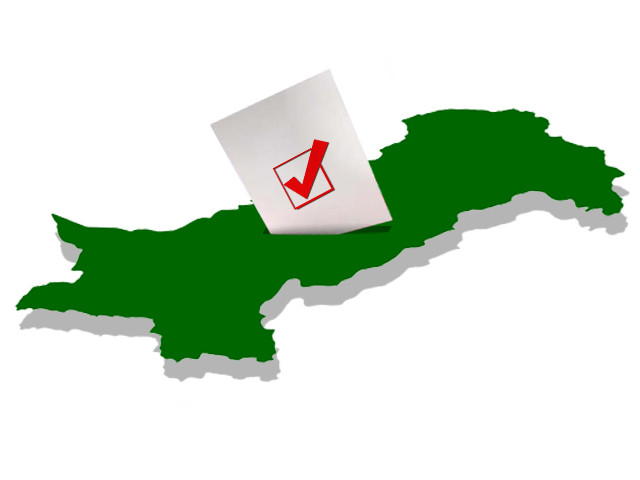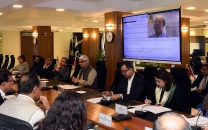Analysis: The ghosts that haunt us
The graduation condition set by Musharraf and the conditions set by Zia, are setting the direction of our democracy.

What the presiding officers are doing under the instructions of our popular and revered Chief Justice of Pakistan may unwittingly fulfill the aspirations of those who failed to derail the democratic process in the last five years. DESIGN: EMA ANIS
Ayaz Amir suffered the cruellest cut of all in the name of the “ideology of Pakistan” and the abstract standards set by Articles 62-63 of the constitution, the legacy of the Mard-e-Momin General Ziaul Haq. It is a joke in the name of the supremacy of the constitution which conveniently forgets the original sin of their genesis.
The democratic transition started with the infamous National Reconciliation Ordinance and, ironically, remained on a bumpy road thanks to the National Accountability Bureau Ordinance—both legacies of former dictator General Musharraf. In order to keep the religious right on board, both the liberal PPP and conservative PML-N didn’t touch General Zia’s self-serving constitutional encroachments. The Supreme Court had the guts to bring changes into the 20th Constitutional Amendments in the self-interest of judges, but it did not scrap Musharraf’s and Zia’s amendments.
Now, the ghosts of dictators, joined by the pedagogues of political Islam, are haunting the electoral process. The graduation condition set by Musharraf and the conditions set by Zia, are setting the direction of our democracy. What a great pity. The nomination form issued by the ECP was fine, even though it was not approved through a due process. But what the presiding officers are doing under the instructions of our popular and revered Chief Justice of Pakistan may unwittingly fulfill the aspirations of those who failed to derail the democratic process in the last five years.
The disqualification of Ayaz Amir on ideological grounds sets a dangerous precedent that progressive and liberal people can’t contest elections. There are shameless fascists who are bent upon ostracizing such people and one sees McCarthyism and Ziaism play against a fragile democracy in transition.
The parliamentarians are to be blamed for the omission and the capitulation of successive centre-left and centre-right elected governments. So are successive judicial setups and judgments that validated the ‘molestation’ of the 1973 constitution. There was no judicial bench in Pakistan that could follow the example of the apex court of Bangladesh that threw out reactionary provisions brought into the secular constitution by military dictators. The 1973 constitution was a delicate compromise between the socialists, nationalists, Islamists and secularists, which is why it became a social contract that survived successive treacheries and coups. Any effort that breaches that compromise will lead to nothing but chaos. Since the Islamists will never be able to agree on a common standard of sharia and a unanimous caliph, they are bent upon demolishing the democratic edifice by using article 62-63. Wasn’t the Meesaq-i-Madina authored by our Prophet (PBUH) a compromise? And shouldn’t we keep this compromise on the 1973 constitution?
One may ask our Islamists whether religious scholars agree on the definition of a Muslim? If so, then why are there violent divisions among the followers of various schools of Sharia?
Is a Muslim defined by the author of the 8th Amendment or the authors of the original 1973 constitution? Don’t we remember the Justice Munir Commission’s report that failed to find an answer to the question of who is a Muslim? Is there a standard constitutional or academic definition of the “ideology of Pakistan”? If Pakistan was created for Islam and the glory of kalima Tayyaba, then why did Jamiat Ulema-i-Hind and Jamaat-i-Islami oppose the creation of Pakistan? Why then are there more Muslims in India, who somehow subscribe to secularism and still remain Muslim? And finally, why didn’t Muslim Bengal keep its allegiance to Pakistan? It seems that while we have new questions every day, no answers will ever be forthcoming.
The author is the secretary general of the South Asia Free Media Association
Published in The Express Tribune, April 5th, 2013.



















COMMENTS
Comments are moderated and generally will be posted if they are on-topic and not abusive.
For more information, please see our Comments FAQ